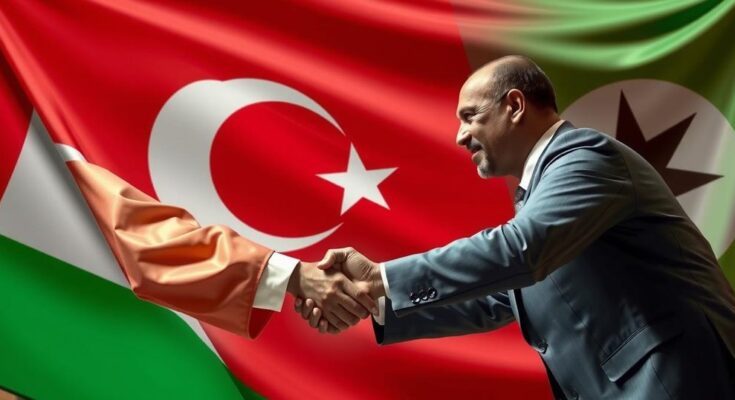Somalia and Ethiopia have reestablished full diplomatic ties after a significant visit by Somali President Hassan Sheikh Mohamud, following mediation by Türkiye. This agreement concludes a year-long rift, marked by the Ethiopia-Somalia Ankara Declaration. Plans for enhanced cooperation in trade and security are outlined, with initial negotiations set to start by February 2025. However, underlying tensions regarding territorial agreements persist, signifying ongoing complexities in regional stability.
Somalia and Ethiopia have officially restored full diplomatic relations following a significant visit by Somali President Hassan Sheikh Mohamud to Addis Ababa. This reconciliatory move concludes a year-long rift that intensified tensions within the Horn of Africa, largely due to successful mediation efforts by Türkiye, which hosted several rounds of negotiations.
The culmination of these discussions led to the Ethiopia-Somalia Ankara Declaration, celebrated by various international parties including the African Union, the United States, and the European Union. This agreement calls for technical negotiations to commence by the end of February 2025, aiming to finalize discussions within four months to bolster mutual cooperation.
In a joint statement, President Mohamud and Ethiopian Prime Minister Abiy Ahmed expressed a commitment to transcend historical differences, emphasizing a future characterized by friendship and solidarity. They highlighted intentions to strengthen trade relations and collaborate on security issues, particularly concerning the fight against extremist organizations such as al-Shabaab.
The rapprochement follows discord stemming from Ethiopia’s advancements with Somaliland, seeking sea access in exchange for recognition of Somaliland’s independence, leading to Somalia cutting diplomatic ties in April 2024. Unresolved questions remain regarding the specifics of this agreement and its impact on Somali-Ethiopian relations.
As tensions within the region shift, Somali Foreign Minister Ahmed Moalim Fiqi has conferred with counterparts from Egypt and Eritrea, displaying an informal alliance formed to oppose any military presence by non-coastal states in the Red Sea—implicitly aimed at Ethiopia. Notably, Egyptian troops are now deployed as part of the African Union Support and Stabilisation Mission in Somalia, contributing to efforts in combating insurgency.
This thaw in relations between Somalia and Ethiopia, orchestrated by Türkiye, suggests a move towards regional stability. However, the ongoing complexities of international politics, especially concerning maritime access and security dynamics, persist.
The restoration of diplomatic ties between Somalia and Ethiopia represents a significant geopolitical development in the Horn of Africa, a region characterized by historical tensions and rivalries. The dispute primarily stemmed from Ethiopia’s negotiations with the breakaway region of Somaliland, creating concerns for Somalia regarding territorial integrity. Türkiye’s mediation efforts played a crucial role in facilitating discussions that led to the recent agreement, emphasizing the importance of regional diplomacy in addressing long-standing conflicts. The evolving alliances, particularly involving Egypt and Eritrea, indicate a broader reconfiguration of power dynamics in the region, which have implications for security and cooperation against extremist threats. Furthermore, the presence of international observers and stakeholders such as the African Union and the European Union underscores the significance of this diplomatic restoration, as it aims to foster stability amidst complex historical animosities and recent hostilities observed in the region.
The resumption of diplomatic relations between Somalia and Ethiopia, facilitated by Türkiye, marks a pivotal step towards regional collaboration in the Horn of Africa. The commitment to move past historical grievances fosters optimism for strengthened trade and security cooperation, specifically in combating extremism. Despite this positive development, the underlying tensions regarding territorial integrity and regional aspirations, particularly with regard to maritime access, remain complex issues that necessitate careful navigation as both nations strive towards a peaceful and cooperative future.
Original Source: ilkha.com




